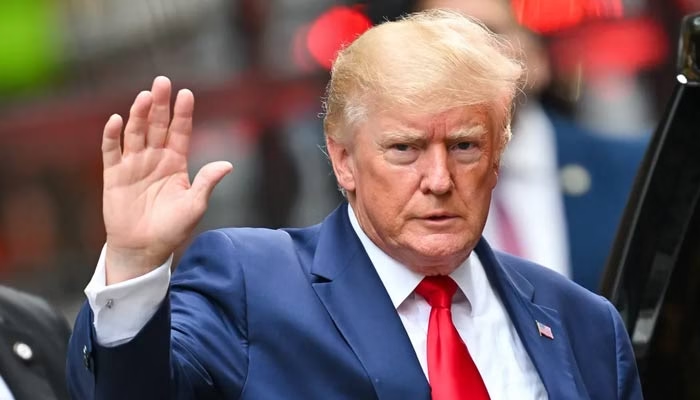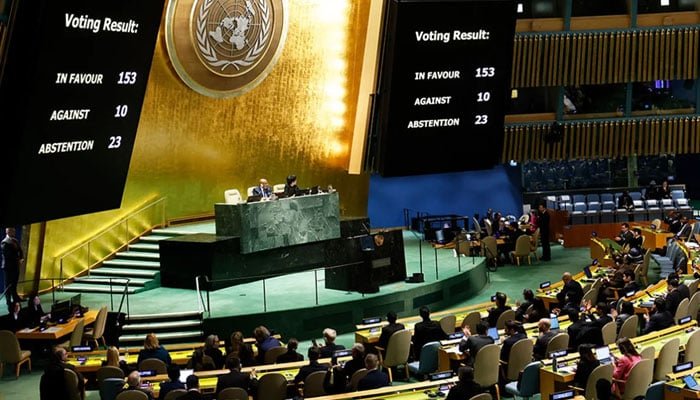US President Donald Trump called his administration’s trade actions an economic revolution that will lead the United States to victory. The statement was made as the Trump administration’s controversial tariffs on Chinese imports began to take effect, triggering a wave of global financial repercussions.
President Trump’s remarks underscore his administration’s firm stance in its ongoing trade war with China. In his statement, Trump expressed confidence that the United States would ultimately prevail, despite the challenges and criticisms that have come from both foreign and domestic sources. “We will win, stand firm,” Trump declared, reiterating his commitment to what he calls a historic economic turnaround.
Trump’s Tough Talk on China
Trump’s statement painted a picture of a nation that had long suffered from unfair trade practices. China has suffered much more damage than the United States,Trump asserted, underscoring his belief that the tariffs, which impose taxes on a wide range of Chinese goods, would force China to reconsider its approach to trade. According to the President, countries like China had treated the United States unbearably badly for years, taking advantage of American businesses and workers.
For months, President Trump has argued that previous administrations were dumb and helpless when it came to negotiating trade deals with China and other foreign nations. However, with his administration’s tariffs, Trump claims that the United States will now take control of its economic destiny. We are bringing back jobs and businesses, Trump said, positioning the trade war as a necessary step to reinvigorate the American economy and reclaim industries that have been outsourced for decades.
Economic Revolution or Financial Crisis?
Trump’s declaration of an economic revolution comes at a time when his administration’s trade policies are having far-reaching consequences. Following the imposition of tariffs, financial markets have experienced significant volatility, with both US and global stocks taking a hit. Most notably, the world’s 500 richest people have collectively lost an eye-watering $208 billion due to the uncertainty caused by the trade war.
This financial shake-up has sparked concern among investors and economists alike, who worry that the tariffs could have long-lasting effects on the global economy. The tariffs are not just a matter of higher prices for goods imported from China; they also disrupt global supply chains, affecting companies that rely on Chinese manufacturers for components. With both China and the United States now imposing tariffs on each other’s goods, the international trade environment is becoming increasingly hostile, potentially stifling global growth.
Will the Trade War Benefit America?
Despite the losses experienced by many, Trump remains steadfast in his belief that the end result will be worth the pain. “It won’t be easy, but the end result will be historic,” he said, promising that the United States will come out on top. He painted the trade war as a necessary step to restore balance and ensure that American businesses and workers are no longer at a disadvantage in the global market.
The President’s assertion that the tariffs will ultimately benefit the US economy hinges on the idea that China and other nations will yield to American demands for fairer trade practices. Trump believes that by applying pressure through tariffs, he can force China to address issues such as intellectual property theft, forced technology transfers, and currency manipulation—practices that he claims have harmed American businesses and cost the country millions of jobs.
The Road Ahead: Uncertainty and High Stakes
As the trade war with China continues to escalate, the path ahead remains uncertain. While President Trump is optimistic about the long-term benefits of his policies, many analysts caution that the tariffs could have unintended consequences for the American economy. Increased prices for consumer goods, supply chain disruptions, and retaliatory tariffs from other nations could all hurt American businesses and consumers in the short term.
The economic consequences of the trade war have already been felt in various sectors, with industries like agriculture, manufacturing, and technology bearing the brunt of the tariffs. Farmers, in particular, have been hit hard by China’s retaliatory tariffs on US agricultural products, leading to a decline in exports and a drop in income for many American farmers.
Making America Great Again: A High-Stakes Gamble
President Trump’s promise to make America great again through his trade policies is a high-stakes gamble that will likely define his presidency. While he is confident that the tariffs will lead to a stronger, more competitive economy, the long-term impact of the trade war remains to be seen.
As the global financial landscape continues to shift, the ultimate success or failure of Trump’s economic revolution will depend on whether his policies can achieve the desired results—bringing back jobs, businesses, and manufacturing to the United States without causing irreparable harm to the broader economy.
While Trump’s optimism remains unwavering, the world is watching closely to see whether his vision of an economic revolution will materialize—or whether it will be remembered as a gamble that led to unintended consequences.



